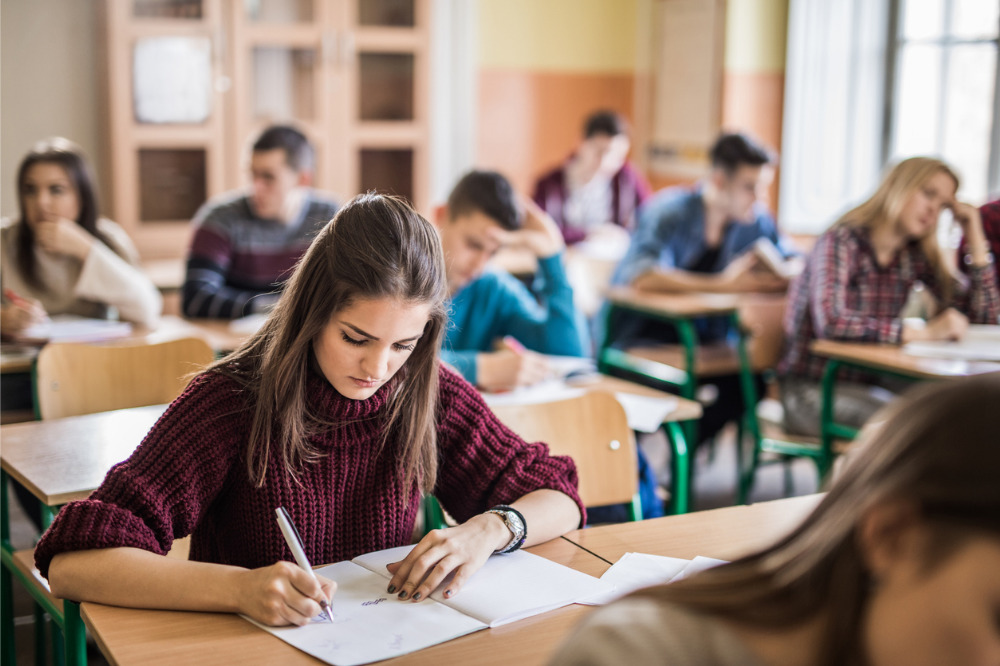
Senior students in NSW are now allowed to study at school in the lead-up to the HSC exams in November.
Around NSW 75,000 students are expected to take part in the HSC, which consist of 120 separate exams lasting up to three hours each.
The exams had been slated for 19 October, a week later than originally scheduled, but NESA pushed back the exams to November 9 to give students more time to get vaccinated.
From today, Year 12 students and those completing HSC exams this year will be able to meet in groups of five at school in a “study bubble”, in line with NSW Health advice.
The staggered return to face-to-face learning begins on 18 October when Year 12 students and those sitting HSC exams will get to attend campus for up to three hours a day, five days a week for exam preparation.
However, the new study bubble means students can meet with four of their peers from this week until the exams begin on 9 November. Under current Public Health Orders, students will only be able to meet in outdoor areas, or well-ventilated indoor open spaces such as school halls or libraries.
The HSC study group can comprise of no more than five students from within the same daily scheduled groupings or study sessions. They must be the same five students for the day; and students in a bubble cannot move between or mingle with other study bubbles during the day.
A study bubble is separate from the buddy bubble for students aged under 18, announced last week.
“This HSC cohort have had such a challenging time with COVID, we hope this study bubble will help ease some of their anxieties ahead of their exams,” NSW Department of Education’s COVID-19 Taskforce Lead Ruth Owen said.
“While at school, HSC students will also be able to access essential curriculum revision, wellbeing support from staff and participate in scheduled, small-group, face-to-face learning with the class teacher.”
‘Giving students the best preparation possible’
In August, a major education service provider announced that HSC students will have access to free syllabus specific video content across more than 40 subjects for the rest of the term to minimise the disruption caused by the COVID-19 lockdowns.
The initiative is being rolled out by education service provider Atomi, an online teaching and learning platform used by 54,000 students in over 200 NSW schools.
Delivered in bite-sized 4-8-minute videos, the content is designed to minimise cognitive load to ensure learning is retained. Concepts are consolidated with AI-driven quizzes and text-based exercises.
The platform quickly identifies where students are strong and weak, then automatically creates tailored revision exercises for them, so they know they’re ready for exams.
Rob Barakat, Co-Founder of Atomi, said the platform provides an efficient way for Year 11 and 12 students to prepare for exams and assessments and give themselves the best chance of performing well in what is a markedly disruptive year.
“Our courses are directly mapped to the curriculum for each state, and are supported with practice questions, from fast revision quizzes to full practice exams with marking criteria, sample answers and scaffolded responses,” Barakat told The Educator.
“Students in years 7-10 don't have high stakes exams, but ensuring continuity of learning is essential to their progress. This can be difficult to maintain from home, with many students experiencing ‘Zoom fatigue’.”
Barakat said Atomi provides “a fresh perspective on delivery.”
“Short, sharp, engaging video content mixed with interactive quizzes provides an awesome mix to ensure students remain engaged and teachers can 'mix it up’,” he said.
“Teachers currently have an impossible task to shift their classrooms online, maintain continuity for their students, whilst many of them are also contending with working from home with their own children and families.”
Barakat said the current time presents both a challenge and an opportunity for principals.
“Atomi works with schools to not only provide immediate support but to work towards what a digital future looks like. COVID has really changed the game. We also work closely with the executive to facilitate that transition towards a digital school strategy.”
“This includes providing principals with rich data and insights around student engagement and learning. Principals can understand which subjects, faculties and year-levels are excelling or which are in need of more support.”


